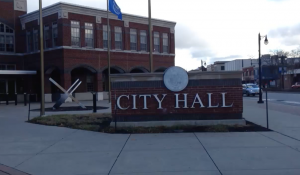As a blue state, third-party candidates in Illinois feel they have never had a fair chance at taking office because of the election law and they are ready for change.
For years, Illinois has been a Democratic state that has often had corrupt politicians operating its election machine. However there are third-party candidates with the same qualifications who feel they are missing their opportunity on the ballot.
Rupert Borgsmiller, the Illinois Board of Elections executive director, said there have been complaints about the third-party signature requirement, but it remains on the books.
“We don’t get involved in whether or not it’s good or not, it’s what the statute requires and that is the process that makes the determination of who makes the ballot,” Borgsmiller said.
But some third-party candidates feel they have no opportunity to succeed with such a high number of signatures required, which will keep Illinois either blue or red until the election law is changed.

“I understand that for third parties to be accepted onto the ballot, there does need to be a stronger requirement, but it makes it harder for a good candidate to run,” said Brian Lambrecht, chair of the DuPage County Libertarians.
“I’d say Illinois is looking at continued dominance of the American two-party systems,” said Gregory Montoya-Mora, a University of Illinois at Chicago political history graduate and Hyde Park resident.
Montoya-Mora, 22, said he doesn’t think Illinois will ever have a green party or libertarian candidate in office because the Democrats and Republicans have platforms targeted to appease their electoral base.
Illinois Green Party Secretary Vito Mastrangelo said it will take a lot of time and money to get a third-party candidate elected, and it’s ultimately up to the voters to get out of the situation.
“It’s a long term process that requires devoting time… it’s not going to happen overnight,” Mastrangelo said.
Under the Illinois Board of Elections rules, Democrat and Republican candidates need 5,000 signatures to make the ballot, but Green Party and Libertarian candidates need 25,000 signatures to make the ballot.

The struggle for third party candidates begins with the money issue; constituents don’t want to support a candidate that may not even make it to the ballot. But without the money they can’t campaign or compete as thorough as the Democrats or Republicans.
“[Democrat and Republicans] have written laws to keep the power, they don’t want third party candidates,” Lambrecht said.
Ken Menzel, deputy general counsel for the Illinois State Board of Elections, said there is always a degree of third party candidates wanting the signature rmequirement lowered, but he said it is up to the General Assembly.
“Republicans and Democrats have to go through a primary election which third party candidates don’t have to do, which is why they need 25,000 signatures to make the ballot,” said Menzel.
Lambrecht said third party candidates lack the major media coverage because they follow Democrat and Republicans who have the most corporate connections.
“Libertarians are socially liberal. We supported gay marriage in the 1970’s when the party was formed, so we’re ahead of the curve, unlike the Democrats who didn’t support gay marriage in Illinois until last year,” Lambrecht said.

Libertarian candidate for attorney general, Ben Koyl, said he wishes they would change the election laws so voters have more of a meaningful choice.
“We’ve been fighting in litigation just to get on the ballot, which costs us money and does not allow us to begin campaigning until much later,” Koyl said.
Koyl said he used to support Democrats but once he realized how much he was taxed for owning his own business and where the tax money was spent, it didn’t add up.
Dick Simpson, a political science professor at University of Illinois at Chicago, said voters generally do not want to give their vote away to a third party candidate because they know a victory will not happen until the law is changed. Simpson served two terms as an independent Chicago alderman in the 1970s.
“There has been a general effort to make it difficult to allow third party candidates on the ballot, just like there are no third-party congressional candidates that have been successful in the past 90 years,” Simpson said.

















Be First to Comment